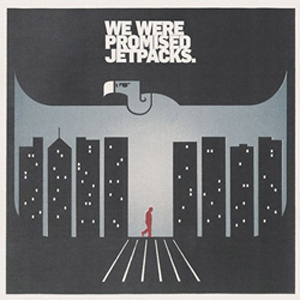Ever since “indie” music saw a resurgence in the early 2000s, the four-piece band of two guitars, bass and drum has been a fairly regular set up. In recent years this has become less common with bands trying to implement more into their music with synths, pianos, samplers, or something else. For We Were Promised Jetpacks, all these extras seem superfluous; they’re a guitar-bass-drums band to the core and they made no bones about it on their first couple of releases, the album These Four Walls and the EP The Last Place You’ll Look. Sophomore album In The Pit Of The Stomach sees them striving for more atmosphere and dynamics, but often sees them falling back on their ability to write straightforward rollicking rock songs.
We get a first taste of something a little different on opening track “Circles and Squares,” where the band adds a bit of piano to the crescendo to give the track a lot more oomph, and again on second song “Medicine” they repeat the trick, but this time with horns. These elements are not really evident beneath the earthquake-like sound of the band, but upon multiple listens these little intricacies become a little clearer, though they’re unlikely to raise more than a passively optimistic thought of ‘that’s nice’ from the listener. The first real example of increased dynamics comes in the form of fourth track “Act On Impulse,” which sees the band starting quietly with a plucked guitars and slowly building over the deadly thud of Darren Lackie’s bass drum. Combine this with Adam Thompson’s solemn, distant vocals including simple-yet-affecting lines like “he died alone,” bring in those horns once again and you have one of the finest songs of the year. “Hard To Remember,” “Sore Thumb,” and colossal closer “Pear Tree,” while not as finely crafted as “Act On Impulse,” see them playing to their strengths again by ably manipulating the quiet-loud dynamic – or the loud-really-loud dynamic as is more accurately the case with Jetpacks.
And this is one of the glaring problems with We Were Promised Jetpacks’ music; they spend so much time at or near full volume that it doesn’t give them many places to go when they want to drill home a point. Sure, they can rely on a tempo change up and a trademark histrionic wail from Thompson, but there’s only so much of this you can take before it all starts to sound like white noise. Thompson’s lyrics are never anything particularly profound or original, so there’s not much to attract your attention there. This is not really a problem since they’re often obscured by the guitars anyway, and it actually pays off on occasion when he yells something elementary in a moment of peak tension; you can’t help but feel a part of it.
The be all and end all for In The Pit Of The Stomach is that, despite a few new experiments, it’s like all their material: good music that you don’t have to think about. You can just turn it on, put it up really really loud and let it hit you. Whether it will impact you with any kind of lasting effect can only be determined by giving it a try.

